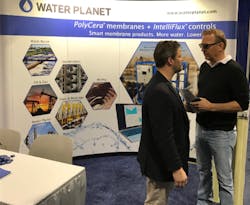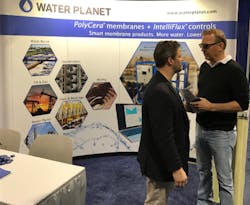Smart membrane products: Kevin Costner, Water Planet team up to advance sustainable water reuse
LOS ANGELES, CA, March 30, 2017 -- In 2009, famed actor and environmentalist Kevin Costner and Eric Hoek, then a professor of engineering at UCLA, joined forces to develop a system aimed at cleaning up oil & gas produced water. In 2010, this system was put to a different kind of test when it was used to clean up the BP oil spill in the Gulf of Mexico. Throughout this process, Costner and Hoek forged a strong alliance that continues to this day with Water Planet Inc., a Los Angeles-based company that sells the world's first smart membrane products.
Eric Hoek, CEO of Water Planet, and famed actor Kevin Costner are committed to advancing water sustainability through reuse.
Just a year after the BP spill, Hoek and his colleague Subir Bhattarcharjee, now Water Planet's Chief Technology Officer, co-founded the company, with Costner and his long-time business partner Rod Lake as the company's founding investors. In just over five years, Water Planet has achieved remarkable and rapid success in commercializing two leading-edge water treatment technologies.
To put Water Planet's accomplishment into perspective, the process of taking a water treatment technology from R&D to the marketplace typically takes a decade or more. Moreover, most technology advancements in the conservative water treatment industry are evolutionary, not disruptive, in nature.
But Water Planet already has orders for scores of systems that incorporate its revolutionary IntelliFlux(r) artificial intelligence based control software in projects from North America to the Middle East. In addition, its PolyCera(r) membranes have broken new ground by merging the robustness of rugged but costly ceramic membranes -- able to treat the most challenging waters -- at the much lower cost of polymeric membranes.
Today, Water Planet is pioneering the use of true artificial intelligence, or machine learning, in the water treatment industry.
"Artificial intelligence brings features that society has grown accustomed to in other areas of their lives to the water industry. The complex mathematics that goes into optimizing a water filtration process can't be calculated offline by humans fast enough to be helpful," said Hoek.
"Computers excel at rapid computations, including compiling waves of information and performing integration, derivatives, or logarithmic fits. Our experience already shows significant cost savings by using artificial intelligence to optimize membrane systems, which helps deliver more water at less cost," he added.
In keeping with "Why Wastewater," the theme of this year's World Water Day, both Costner and Hoek remain deeply committed to advancing water sustainability through reuse.
"It took an environmental disaster to make the connection with Eric and now Water Planet, but I am proud to be involved with a team that is poised to make a fundamental difference for a world seeking solutions to ensure our water future," Costner said.
About Water Planet
Based in Los Angeles, California, Water Planet (www.waterplanet.com) sells the world's first smart membrane products, which enable the most reliable and cost-effective approach to industrial water reuse. PolyCera(r) robust & easy-to-clean ultrafiltration membranes and IntelliFlux(r) self-adaptive flux optimization for ultrafiltration membranes mean more water and less cost.
Read More
Artificial Intelligence: Can It Make Our Water Infrastructure More Sustainable?
Real-Time Control System Optimizes Filter Backwashing
Produced water project in Wasco, Calif., uses Water Planet software
Produced Water Treatment: Pilot Test Results of Integrated Mechanical and Membrane System

